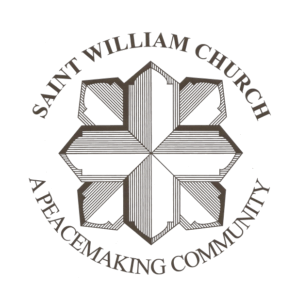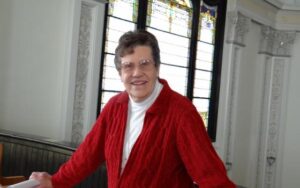Inviting US & Latin American Catholics to Walk Together

Ellie Hidalgo, Mauricio López, Toni Miranda and Silvia Muñoz at the Ignatian Spirituality Center in Miami on July 3.
Valuing the role of youth in our Church and society as agents of transformation. Accompanying victims of social and Church injustice with recognition and reparation. Deepening the participation of women in the Church’s decision-making bodies and contributing to the discernment about women deacons and new ministries. Welcoming, protecting, and integrating migrants and refugees.
These are among the 41 pastoral challenges identified during the synodal, listening process that took place in Latin America & the Caribbean last summer and fall. And they reflect many of our own pastoral challenges in the US and beyond.
So how can US and Latin American Catholics walk together on this synodal journey as one Church? The possibilities for forming connections across our continents will be explored during our webinar next week with Mauricio López, member of the Commission on Methodology for the Synod of Bishops. The webinar takes place Wednesday, February 9 at 7 pm in English with Spanish interpretation available. (Register here.)
López, who lives in Ecuador, will share his insights and reflections from the first Ecclesial Assembly of Latin America and the Caribbean — an unprecedented assembly of clergy, religious, and laity who came together in November to discuss the needs of the region in a synodal way and to discern how the Holy Spirit is calling the Church in Latin America to respond in these times. López was the organizer at the heart of the assembly’s discernment process, a prophet of synodality, and is also director of the Pastoral Center for Social Action and Latin American Episcopal Council (CELAM) Networks.
To foster this bridge building work, theologian Dr. Elsie Miranda, director of accreditation, Association of Catholic Schools and director of formation at Barry University (Miami), will respond to López’s remarks. Miranda also served as president of the Association of Catholic Hispanic Theologians of the United States and recently reflected on Our Lady of Guadalupe as giving voice to the powerless and restoring dignity to those who are dehumanized.
The Latin American Church is seen as a worldwide leader in the school of synodality, providing concrete models and inspiration for the rest of the Church. Even with the limitations of organizing synodal consultations during a pandemic, the Latin American process reveals that ordinary, baptized Catholics can wake to their calling as missionary disciples when they are listened to and invited to participate in conversations and discernment processes. The people of God, including the youth, become more engaged when they are asked to shape the future of the Church and when they see their concerns become reflected in pastoral plans that then are implemented.
Already, creative efforts are being made to create connections and build bridges between youth across continents. Last week Chicago’s Loyola University announced that Pope Francis will participate in a February synod consultation with migrant college students from North, Central, South America & the Caribbean! You can read about the Argentine woman who helped to shape this historic synodal event here.
Looking forward to zooming with you next Wednesday as we continue to deepen solidarity on this synodal journey.


